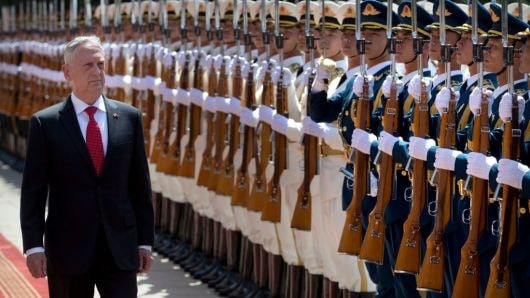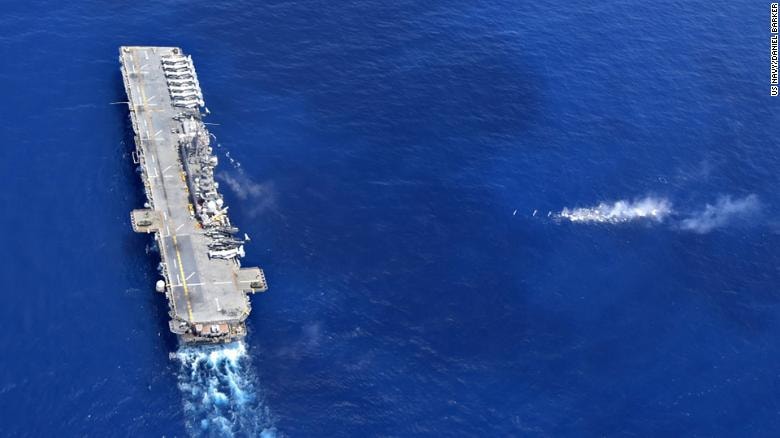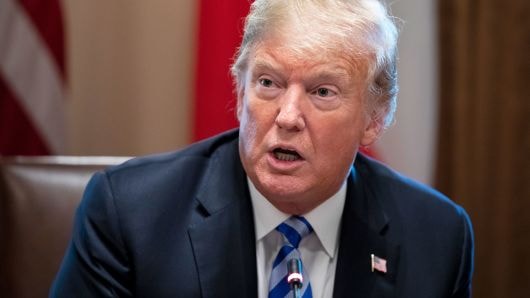The US-China war spreads to a new front
(Baonghean) - One day after China announced the cancellation of a high-level security meeting with the US, the US also announced the cancellation of Defense Secretary James Mattis' visit to China, which was scheduled to take place in mid-October.
With this move, analysts say that tensions between the two superpowers, the US and China, have "spread" from the previous trade, political, and military fronts to a new front of security, notably the security issue in the East Sea.
America opens a new front
The cancellation of James Mattis' visit has been officially confirmed by the US Department of Defense. Previously, according to the Pentagon's plan, James Mattis would go to China to meet with his counterpart Wei Fenghe, but China refused to arrange it. This is consistent with the information that China previously released about the cancellation of the US-China high-level security meeting.
 |
| US Defense Secretary James Mattis during a previous visit to China. Photo: AFP |
The US cancellation of Defense Secretary James Mattis’s visit to China comes amid a tense relationship between the two sides on many fronts, including trade, politics, and the military. The US press has simultaneously published information that the US’s decision is also related to China’s activities in the East Sea.
Previously, China did not allow the US amphibious ship USS Wasp to visit Hong Kong, China. In addition, the US side also accused Chinese ships of approaching US ships "unsafely" in the East Sea.
According to the announcement of the US Department of Defense, the incident occurred on the morning of September 30 when the US Navy ship USS Decatur entered the 12-nautical mile zone around Gaven Reef and Gac Ma Reef in Vietnam's Truong Sa archipelago, which are currently illegally occupied by China.
The US Navy called the operation part of a freedom of navigation operation in international waters. At that time, the Chinese destroyer Luyang approached the USS Decatur at an “unsafe and unprofessional” distance and made moves to force the USS Decatur to leave the area.
Therefore, analysts say that the cancellation of Mr. James Mattis's visit shows America's opposition to these actions, and at the same time sends a clear message that America is ready to open a new front in the tense confrontation with China, which is the security front in the East Sea.
The dispute between the US and China regarding China’s militarization activities in the East Sea has been going on for a long time. Despite China’s objections, the US has continuously carried out patrols to protect the freedom of aviation and navigation in the East Sea, which US Navy Commander Richard Spencer affirmed “will be deployed at all costs”.
Accordingly, the US will allow warships to pass through all internationally recognized free waters at all times to ensure that trade and trade routes are always open.
Analysts say that in the context of the unprecedented tension between the US and China since President Donald Trump took office, the US opening a new front in the confrontation with China is not simply a tactic of "putting pressure to negotiate" that Donald Trump often uses, but more deeply, it is an increasingly clear change in the US administration's orientation of the relationship with China. Accordingly, China is also identified as a "strong opponent" of the US, similar to the way the US is "positioning" Russia.
Donald Trump's real purpose
When making accusations in the middle of the recent United Nations General Assembly session about China's interference in the midterm congressional elections, President Donald Trump explained that China did not want Donald Trump's Republican Party to win because the current US administration is considered to have the toughest approach to China ever.
 |
| The US amphibious assault ship USS Wasp was not allowed by China to make a port call in Hong Kong. Photo: CNN |
To date, there has been no concrete evidence of Chinese interference, and China has immediately denied the US accusations. However, there is one detail that Donald Trump was not wrong to mention: the current administration under his leadership is taking an extremely tough approach in its relationship with China.
The toughness that Mr. Donald Trump mentioned has been proven through a series of recent developments. Initially, the tense confrontation between the US and China was mentioned most in the trade field when the two sides continuously imposed "huge" tariffs on each other's imported goods.
But not long after launching a trade war against China, the US continued to "strike" in a series of other areas: the diplomatic field when accusing China of election interference at the United Nations General Assembly forum, the military field when sanctioning Chinese entities related to the purchase of weapons from Russia, the security field when canceling the visit to China of Defense Secretary James Mattis.
US President Donald Trump's continuous increase in pressure on China on the trade, military and political fronts has made the public wonder about his true intentions at this time, when the midterm congressional elections in the US are about to take place.
The upcoming vote is very important for Donald Trump's Republican Party, deciding whether the Republican Party will continue to control the US House of Representatives and Senate. Therefore, according to analysts, proactively pushing tensions with China to a new level is a strategic calculation by Donald Trump and the Republicans.
First, if the Republicans are unable to maintain control of the House and Senate, China will become the reason for Donald Trump to avoid criticism.
Second, the heightened tensions between the US and China could also divert domestic public attention from a series of legal troubles for former staff members of Donald Trump's 2016 campaign - a factor that could also negatively impact the upcoming election.
But besides the short-term “tactical” factors, there have been increasingly strong opinions among American politicians expressing concern about the rise of China – a rise that, although China calls “peaceful”, still has the potential to threaten America’s position as a superpower in the future.
And one figure who played a key role in convincing Donald Trump of this tough approach was US National Security Adviser John Bolton.
 |
| US President Donald Trump has maintained an unprecedentedly tough policy towards China since taking office. Photo: Getty |
After China canceled a high-level US-China security meeting, and after US Defense Secretary James Mattis canceled his visit to China, both sides remained calm about the tensions between the two countries.
While Chinese Foreign Minister Wang Yi declared that there was “no reason to be afraid”, US Defense Secretary James Mattis also affirmed that he “did not see the relationship with China getting worse”.
However, analysts say the situation is not so optimistic, just like the way the trade war between the two superpowers has progressed in recent times, from small conflicts that seemed to be able to be resolved quickly turned into a large-scale trade war with unprecedented "hits" of value-added tax. Therefore, there is no guarantee when the confrontation between the US and China will cool down.


